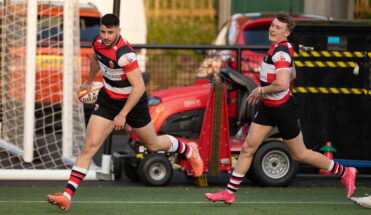Campese lights up The Greenyards: 30 years on
The recent flashbacks to Scotland’s 1990 Grand Slam win provided a heady dose of nostalgia from what will always be one of the greatest days in the history of Scottish rugby. It really was the best of times, when the nation came alive to the drama and excitement of sporting success.
That feelgood factor was still in the air one month later, when a stellar cast of international rugby greats descended on the Borders for the 100th playing of the Melrose Sevens on Saturday 14 April. If the intention of the organisers was to deliver an unforgettable occasion, they certainly delivered. Thirty years on from a day that could not be spoiled by the persistent downpours which drenched most of the 15,000 crowd, the memory of a quite magical occasion at the Greenyards does not fade.
Eight of Scotland’s Grand Slam heroes were in action for their clubs that day, an unthinkable prospect today: Gary Armstrong, Craig Chalmers, Scott Hastings, Gavin Hastings (originally listed as a forward by London Scottish, until a late change saw him return to the backs), Iwan Tukalo, Kenny Milne, John Jeffrey and Finlay Calder.

Lifting the trophy – Randwick’s John Maxwell, their captain/coach.
In the guest sides, the Racing Club de France squad featured internationalists Frank Mesnel, Eric Blanc and the Lafond brothers Jean-Baptiste and Jean-Marc, while Randwick, from Sydney, included two legends of the game, fly-half Mark Ella and winder David Campese, at a time when Campese was arguably the most famous rugby union player in the world. For good measure, the visitors were further strengthened by Wallaby internationalists Lloyd Walker and Acura Niuqila in their side, along with Australia Sevens captain John Maxwell and under-21 cap Michael Chieka (later to become coach of the Australian national side). The tournament’s first ever visiting side from the Southern Hemisphere had not come all this way for just a bit of fun.
And to add another special ingredient to the mix, Harlequins travelled up from London. Their box office names did not duck out of a return north of the border so soon after having had their Grand Slam intentions torn up by a rampant Scotland in the Murrayfield bear pit. Like Daniel into the lion’s den, in walked a brave Will Carling; the Harlequins captain was, in the eyes of many, the epitome of England’s misplaced confidence ahead of that Grand Slam decider. Peter Winterbottom, another of the vanquished England XV, must have been delighted that his club captain had led the team to the Greenyards, because the flanker’s presence was almost overlooked as Carling took on the role of pantomime villain.
For Carling, it was water off a duck’s back. He had heard worse, fairly recently, and his opening gambit was a hat-trick of tries in Harlequins’ opening tie against Boroughmuir. By contrast, Racing Club were a big disappointment, other than to Stewart’s Melville who knocked them out 14-8 in their first match. Jean-Baptise Lafond and Mesnel did not play, the latter “explaining his hamstring strain in the bar late on in the day” according to reports, and shorn of those talents, the Edinburgh club took a major scalp.
The early stages of the tournament had given a hint that this was destined to be a special day. In the tournament’s opening tie, a Harry Hogg hat-trick of tries for Jed-Forest whetted the appetite, a feat topped by Alex Moore of Edinburgh Accies whose blistering pace propelled him to four first-half tries against GHK, an eye-catching performance which may have helped to launch him into the Scotland side to face New Zealand in Auckland a few weeks later.

David Campese marked his arrival with a try just 36 seconds into Randwick’s first match, a 30-0 win over Glasgow Accies, and elsewhere, as if the crowd needed any further evidence that no quarter was being asked or given, Heriot’s conceded a penalty try to London Scottish when Kenny Milne administered an off-the-ball elbowing to his grand Slam colleague and good friend Gavin Hastings. It was all happening.
Hosts Melrose, who had not lifted the Ladies Cup since 1975, needed four minutes of injury time to get past Ayr in the second round. After that struggle, no-one could have anticipated the titanic battles that were to follow.
Next up for the home side was a quarter final with Harlequins. If ever there was a fixture which would unite Border rivalries, this would be it: the Grand Slam all over again, Scotland’s club champions against Carling’s darlings in front of a raucous, partisan crowd. The visitors took control and led 12-0 at the break, but the Greenyards roared as Keith Robertson – who was part of the last Melrose victory 15 years previously – inspired a comeback, with tries from the veteran centre and Andy Purves levelling the score. Will Carling was given a roasting from spectators on the banked grass behind the posts as he waited for conversions to be lined up, and it was a measure of the man that he took this ‘banter’ in good humour.
With only seconds left on the clock, Melrose were awarded a penalty 40 yards out on the right. The unwritten rule of sevens is that you never kick a penalty, but not a soul in the crowd protested as Craig Chalmers lined up at goal. The Greenyards fell silent, then erupted as the Scotland stand-off managed to guide a difficult kick over the bar. Harlequins had been sent homewards. Suddenly, there was belief that this could be Melrose’s year at last – although there was no time to get carried away, with Randwick awaiting in the semi-finals.
It seemed impossible that the quarter-final drama could be repeated, but if anything, it was superseded. Once again, Melrose had to make a comeback to level the scores at 12-12, countering a brace of Campese tries. Once again, it was a flash of Robertson genius and another try from Purves which kept the hosts in contention. Once again, Melrose earned a penalty, a minute from full-time. Once again, the crowd held its breath as Chalmers indicated he would kick at goal – and slotted a superb pressure goal to put Melrose 15-12 ahead. But there was still time to re-start the tie, and in overtime, Randwick released Campese once again from near the halfway line. Chalmers and Purves tried valiantly to stop him, only to see Campese dive early for the line to take advantage of the conditions, ‘aquaplaning’ over the line in the corner for the most dramatic of scores, with Purves clinging on to him. There was no time left for the conversion, and Randwick squeezed through by 16-15, all of their points having been scored by ‘Campo’. It was heartbreaking for Melrose, and the sense of anti-climax at the end of such a sensational tie was overwhelming.

The great David Campese in full flight
Even at that stage, it was not a foregone conclusion that Randwick would go on to win the tournament. Waiting for them next was the great Kelso seven, who had progressed to their 11th Greenyards final in 13 years. Alas for the Poynder Park side, Randwick proved too strong, triumphing 26-8 to take the trophy. As Kelso playmaker Andrew Ker was to concede later, “we were never in the hunt”.
After the tournament, the talk was all about the semi-final, rather than the final. “If it had not been for the wet, I would not have made that try against Melrose,” Campese would admit afterwards. It was little consolation for the hosts, who had played heroically.
“It was gutting for us,” recalled Andy Purves this week, now age 51 and a successful local businessman as well as a Melrose director. “It was a young team, apart from Keith [Robertson], who was absolutely outstanding that day. I will always remember he took on Carling in the quarter final, bounced him and went past him round the outside. Fortunately some of us were still in the team when Melrose finally won the cup in 1997 and 1998 and put the regret to bed, but I know that if we had not won eventually, the 1990 tournament would have eaten away at me to this day. It still does, to an extent, and it is fair to say I have re-run it in my head a few times, because if we had held out against Randwick I am sure nothing would have stopped us winning the final.

“We left Randwick with just enough space to give Campese a line. If it had been a one-on-one sprint he would have beaten me, but Craig Chamers was covering fast, which meant Campese had to check his step, and that allowed me to get to him. When we skidded towards the line I couldn’t see if he was paddling or not, but it was probably a fair try.
“For years, I blamed myself, until Keith Robertson admitted that he was to blame, by giving them half an overlap. I thought: ‘Now you tell me! I’ve had sleepless nights about this!’”
Campese had lived up to his reputation, and some, finishing as both top try-scorer with seven and top points gatherer with 46. The whole story is summed up in a classic photograph by Scotsman photographer Hamish Campbell, who captured the defining moment that Campese and Purves glided to a halt over the try line at the end of the epic semi-final, Campese holding out his hands to demonstrate that he was over the line for a try, and Purves looking desperately for the referee to disagree.
“It was all rather ironic for Melrose,” reported Scotsman rugby writer Graham Law on the Monday morning, “that Campese had apparently asked that he be accommodated in a house with a swimming pool during his stay in the Borders. Local builder and club stalwart John Crawford had obliged though, as other committee men pointed out, the swimming pool was there before Campese’s request.”
By Donald Walker
Photos by Hamish Campbell, courtesy of The Scotsman
Related Fanzone
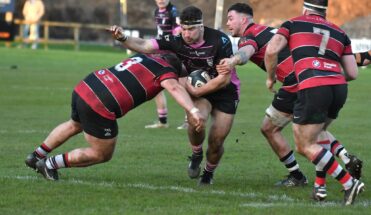
Review of Round 1 | Super Series Sprint
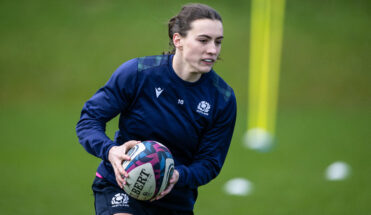
Preview: Italy v Scotland Women
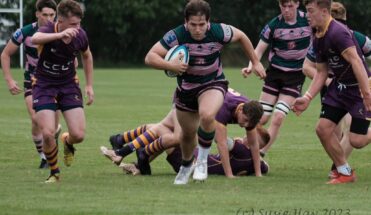
Jake Shearer: Stepping up
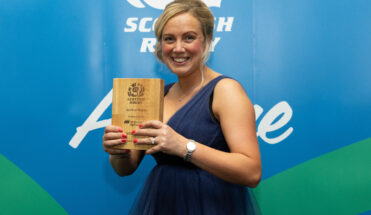

Watch: Julie Coutts | Spirit of Rugby Award
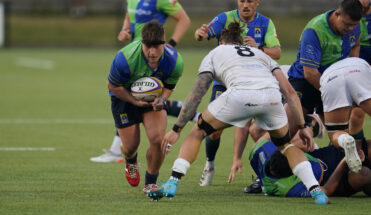
Corey Tait: Roaring Bears are Raring to go
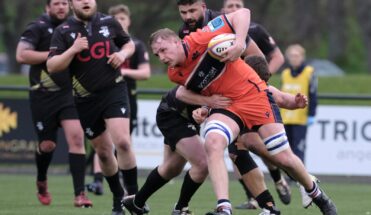
Guide to the Games | Round 1
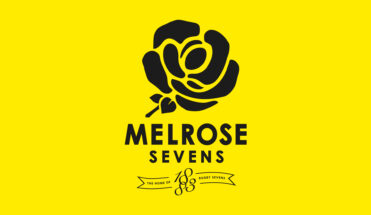

Highlights: Melrose Sevens – Men’s Centenary Cup


Highlights: Melrose Sevens – Women’s Mike Bleasdale Cup
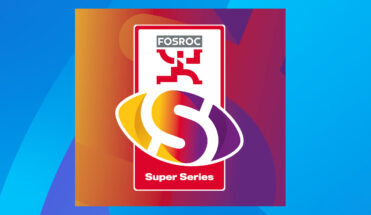
Podcast: 2024 FOSROC Super Series Sprint | Preview Show
